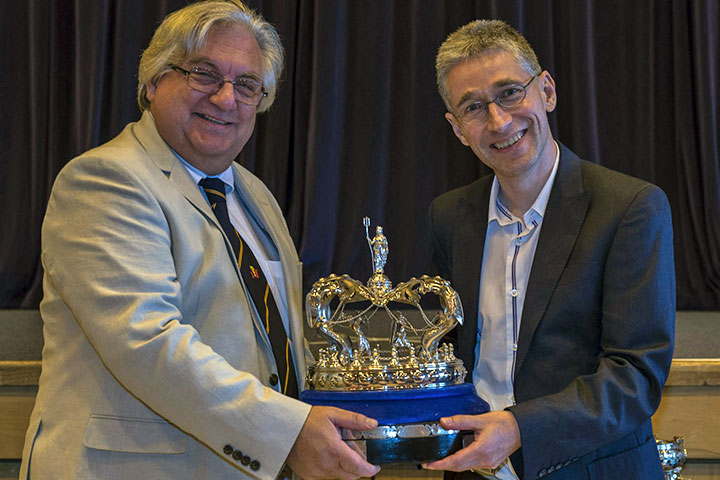


A Sicilian Stunner - The Kalashnikov
This increasingly popular opening is easy to pick up as the Black pieces can usually be developed quickly and smoothly. Many of the ideas are thematic and Black can achieve attacking positions in several of the variations.
While doing the British championship commentary during one of the earlier rounds, after the game Gary Lane vs Justin Tan had finished abruptly I suggested that the draw offer in chess is a very artificial concept. It seemed to me that this game was entering a very interesting stage, with plenty of play left, and ending at that point just looked rather strange when you looked at it more deeply.
I made the point then (and make the point now) that imagine if a tennis match between say Novak Djokovic and Roger Federer was agreed drawn, as neither of the players felt the need to continue. There would be a near riot in the stands. And yet in chess, we seem to have accepted this. I would be interested to know where the draw offer in chess originates from. Are any keen readers able to point out exactly when the draw offer came into being? And what prompted it?
Time-lapse video of the playing hall
The reason I mention all this is that in the final round of the British chess championships held in Torquay, IM Richard Palliser agreed to a draw when he still had a theoretical chance of winning the tournament.
The final position has been played at least half a dozen times before
To win the championship, Palliser would have had to win that game, hope that Stephen Gordon got a result against Adams, and then win the playoff. A tall order, to be sure, so perhaps it was understandable that he should want to curtail the game at that moment, to wrap up a good tournament and bag a decent prize. But others might argue that if he had any chance of becoming British Champion, and there was still plenty of play left in the position, then why agree a draw? It seemed to me that the fact that the draw offer exists at all harmed Palliser at that moment. And it’s not like I’m just picking on him. I have had plenty of such moments myself, like when I agreed a draw at the recent Scottish Championship in the last round, thus ending my hopes of winning the tournament. In my view the sooner the draw offer is done away with in chess the better, and then people would be forced to fight in any position.
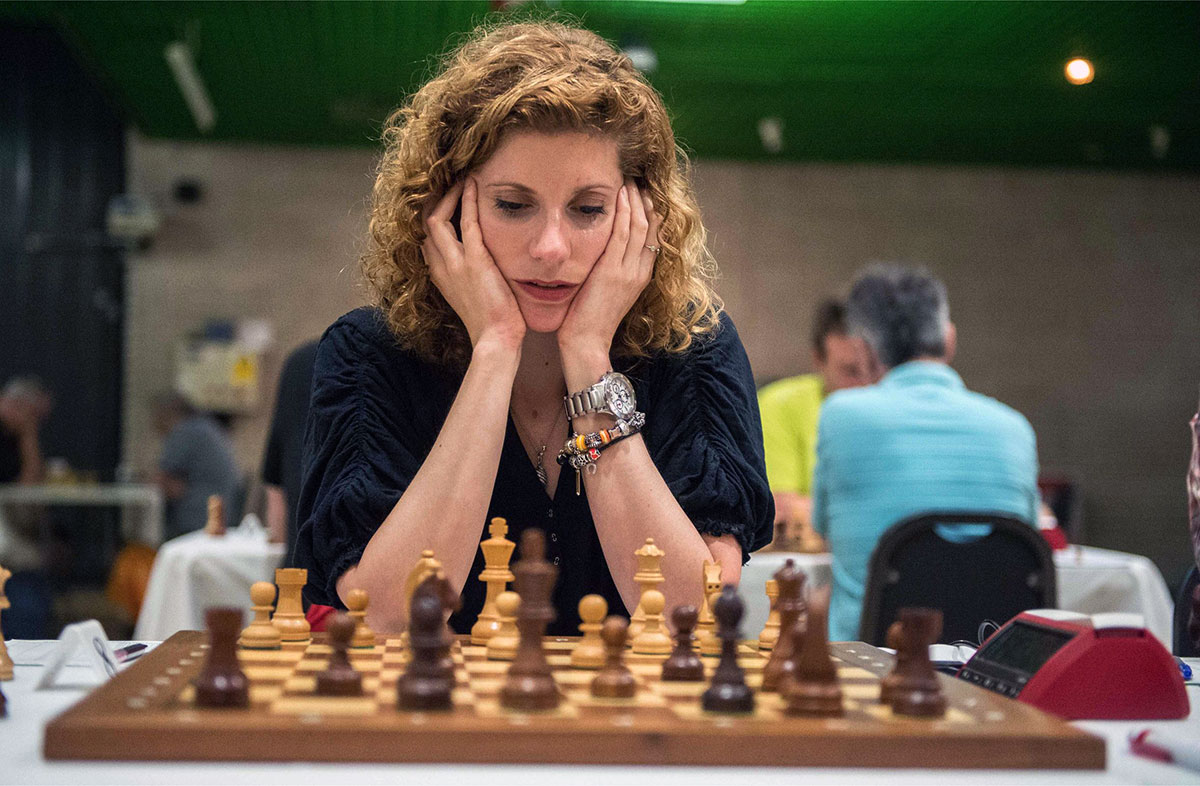
Jovanka Houska secured the British Women's Championship title | Photo: John Upham
One player who was presumably happy with Palliser’s draw offer was his opponent Jovanka Houska, who gladly accepted as she only needed a draw to win the Women’s Championship for the ninth time — a record.
“Jovie” as she is affectionately known, is a popular figure and is by far the strongest female player to regularly take part in the championship. It is up to the younger generation to emerge from the pack and challenge her, although it is somewhat worrying that out of the top 100 under 18s on the English grading list, the only female player listed is Cassie Graham. More needs to be done to encourage girls to continue with chess beyond their younger years.
In any case Richard was right, Stephen Gordon did not get a result, and Michael Adams reigned supreme in the British championships once again, for a remarkable seventh time. I think there is little argument now, if there ever was, that Adams is the strongest English chess player of all time. In the last two rounds he played near faultless chess.
IM Lawrence Trent reviewed this and other British Champs highlights in The Weekly Show
The Sicilian Rossolimo for White
The Rossolimo Variation 3.Bb5 is considered to be one of the strongest replies to 2…Nc6 in the Sicilian Defence. The fact that the move has been played by practically all the top players proves its popularity and strength. But the most interesting aspect of playing 3.Bb5 is that we force sharp, attacking players who love to have the initiative to forget about the Open Sicilian and to adjust themselves to a new world, one full of positional ideas, manoeuvres and nuances.
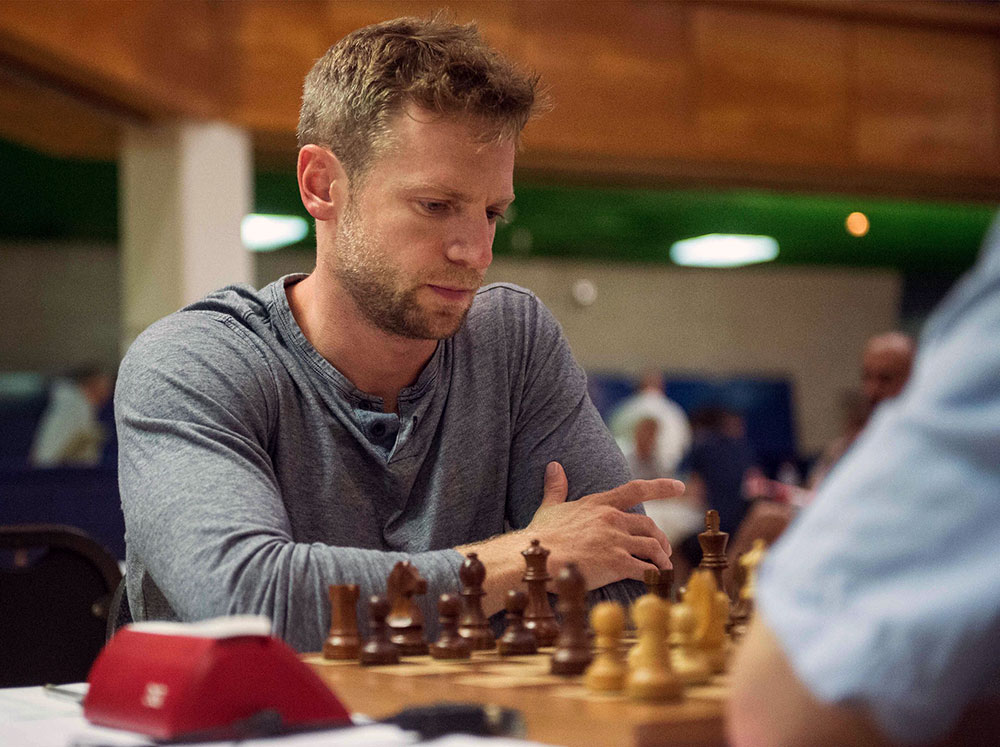
GM Stephen Gordon took a shot in the last round, but became Adams' sixth victim | Photo: John Upham
Without descending into hero worship, what makes Adams so strong? Impressive analytical skills, cold-eyed objectivity and experience of playing in world-class tournaments are just some of the factors. But what perhaps stands out most of all is the consistency, with which Adams approaches a game of chess. Observing him from afar, it seems most of his mannerisms remains constant during play, he seems incredibly relaxed, and seldom does he leave the board. It’s this consistency that has enabled him to build a body of work over the last twenty years that other English players can only aspire to.
| Rd. | Bo. | SNo | Name | RtgI | FED | Club/City | Pts. | Res. | |
| 1 | 2 | 29 | IM | Rudd Jack | 2275 | ENG | Barnstaple | 4,5 | s 1 |
| 2 | 2 | 19 | IM | Pigott John C | 2384 | ENG | Little Heath | 4,0 | w 1 |
| 3 | 1 | 23 | FM | Ashton Adam G | 2323 | ENG | 3cs | 5,0 | w 1 |
| 4 | 1 | 10 | IM | Haria Ravi | 2430 | ENG | Wood Green 4ncl | 6,5 | s ½ |
| 5 | 2 | 17 | IM | Palliser Richard Jd | 2399 | ENG | Eagle & Child | 6,5 | w 1 |
| 6 | 1 | 5 | GM | Tan Justin Hy | 2513 | AUS | None | 6,0 | s ½ |
| 7 | 1 | 1 | GM | Howell David Wl | 2697 | ENG | None | 7,0 | s ½ |
| 8 | 2 | 11 | IM | Pert Richard G | 2430 | ENG | Brentwood | 5,0 | w 1 |
| 9 | 1 | 4 | GM | Gordon Stephen J | 2516 | ENG | None | 6,0 | w 1 |
Here's how Adams' tournament shaped up
Adams didn't play any tournaments in the months leading up to the British Championship, preferring to take a break and prepare. I caught up with him at a special event in London — a simul against secondary school students in downtown London at the Old Bailey courthouse. It was a beautiful and unusual venue for a chess event. Check out the video below which includes an interview with Mickey. — Macauley Peterson
The top board was 1700-rated Jason Covey, who essayed the French Defence. GM Nick Pert annotated the game:
The French Defence for the Tournament Player
This French Defence DVD is a complete attacking opening repertoire for black after 1.e4 e6. GM Nick Pert has played the French defence his whole life and provides all his la test and most up to date analysis crammed into 1 DVD.
GM Nick Pert who organized the simul for the King Edward's School, interviewed the players
David Howell finished alone in second place and, although I’m sure he wanted more, he was also impressive. It’s not just about winning tournaments and if you can continually finish up there, that shows something else — consistency. Perhaps that’s the holy grail that competitors really desire; the ability to keep producing a level of performance in line with their own expectations.
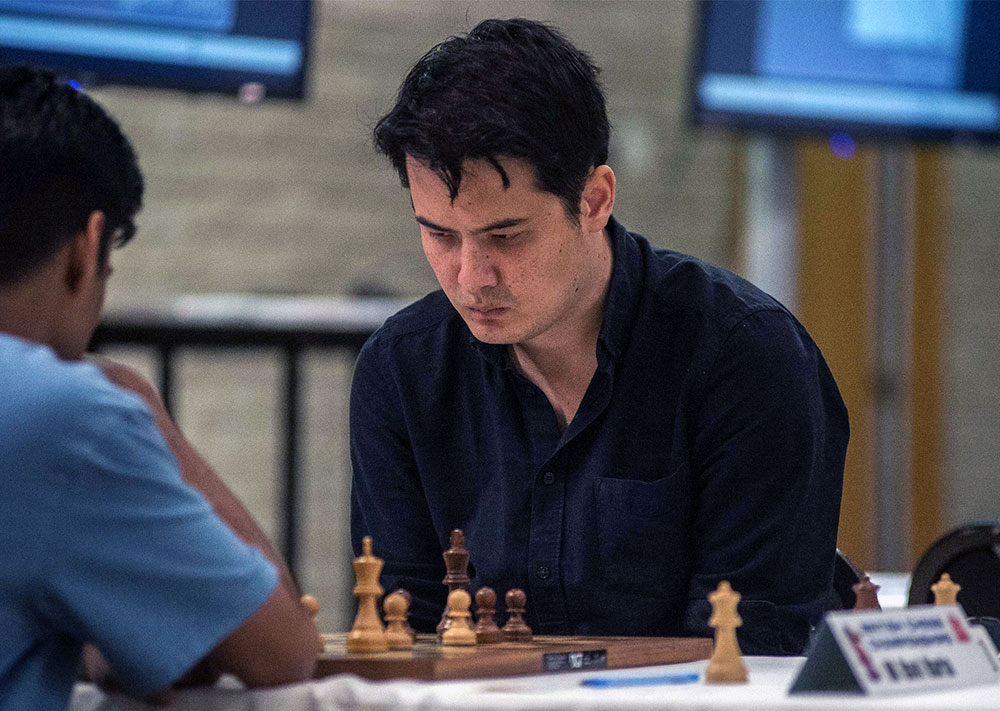
Howell finished 2nd, a half point behind Adams | Photo: John Upham
White against Keith Arkell in the last round turned into another weary battle of attrition for both players. I’ve known Keith for many years, and I know that he feels somewhat undervalued as a chess player, that somehow his efforts have been overlooked by the chess media at large. In defeat, he was probably more impressive than in his preceding wins in the rounds leading up to this one.
A lifetime repertoire: Play the Nimzo Indian
This DVD provides everything you need to know to be able to play one of the most classical openings with Black, the Nimzo-Indian, arising after 1.d4 Nf6 2.c4 e6 3.Nc3 Bb4. Nearly every World Championship and top tournament features the Nimzo-Indian.
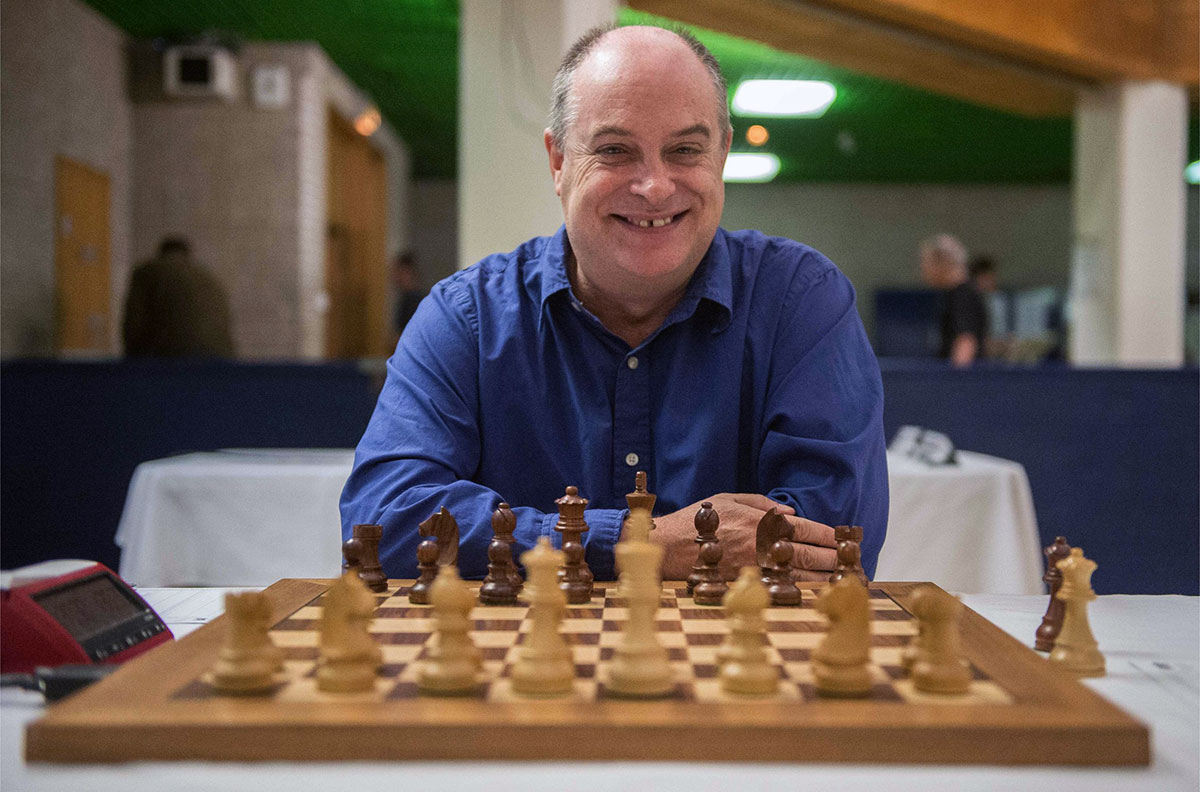
Keith Arkell finished tied for 8th place with 5½ points | Photo: John Upham
After the last game had finished, I challenged Keith to a game of golf. Sadly, my ability to access a back-right pin position to an elevated green with a soft draw, proved hopeless against Keith, who merely putted everything off the tee. I sympathised with him that 5½ points was unable to win a prize. Playing chess for money can be tough at times, and another one who came up short was John Emms, despite a brave effort against Ravi Haria.
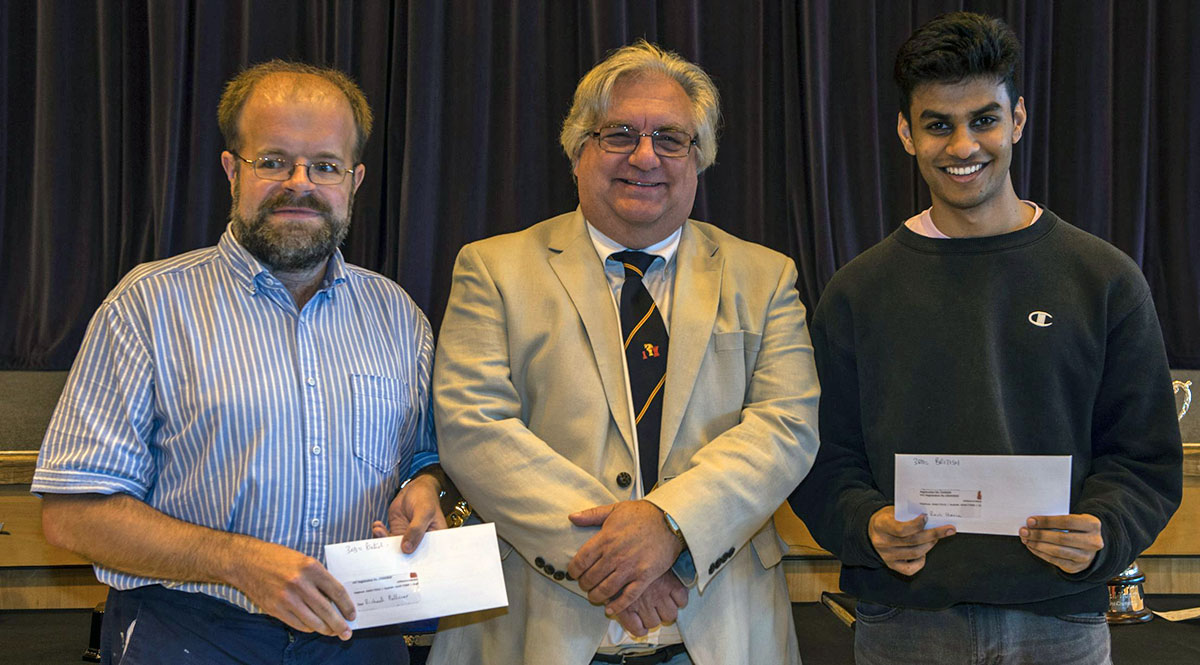
Palliser and Haria tied for 3rd with 6½ points | Photo: John Upham
| Rk. | Name | RtgI | Pts. | ||
| 1 |
|
GM | Adams Michael | 2690 | 7,5 |
| 2 |
|
GM | Howell David Wl | 2697 | 7,0 |
| 3 |
|
IM | Haria Ravi | 2430 | 6,5 |
|
|
IM | Palliser Richard Jd | 2399 | 6,5 | |
| 5 |
|
GM | Gordon Stephen J | 2516 | 6,0 |
|
|
GM | Tan Justin Hy | 2513 | 6,0 | |
|
|
IM | Houska Jovanka | 2422 | 6,0 | |
| 8 |
|
GM | Emms John M | 2481 | 5,5 |
|
|
GM | Arkell Keith C | 2461 | 5,5 | |
|
|
IM | Wadsworth Matthew J | 2418 | 5,5 | |
|
|
IM | Eggleston David J | 2399 | 5,5 | |
|
|
FM | Willow Jonah B | 2343 | 5,5 | |
|
|
IM | Bradbury Neil H | 2322 | 5,5 | |
|
|
FM | Derakhshani Borna | 2300 | 5,5 | |
|
|
FM | Storey Charles H | 2261 | 5,5 | |
| 16 |
|
GM | Williams Simon K | 2468 | 5,0 |
|
|
IM | Pert Richard G | 2430 | 5,0 | |
|
|
GM | Ward Chris G | 2418 | 5,0 | |
|
|
FM | Ashton Adam G | 2323 | 5,0 | |
|
|
FM | Claridge-Hansen William | 2297 | 5,0 | |
| 21 |
|
GM | Fernandez Daniel H | 2466 | 4,5 |
|
|
IM | Lane Gary W | 2364 | 4,5 | |
|
|
IM | Bates Richard A | 2352 | 4,5 | |
|
|
IM | Pein Malcolm | 2312 | 4,5 | |
|
|
IM | Rudd Jack | 2275 | 4,5 |
Once the tournament was over it was traditional for some of the players to wind down with a few drinks. Back in the day, it used to be that Applebys bar was the place where everyone would hang out during the tournament although, as the grandmasters have begun to approach their twilight years, the thought of dragging our increasingly infirm bodies up even the small hill that approaches that particular establishment has proved less enticing, so more convenient venues have been found. But sentimentality kicked in and the inspiring views across the bay provided by that bar once again drew a strong chess crowd. The evening finished for me playing blitz chess for money in the beer garden outside, probably because like most chess players my social skills are unable to tolerate merely sitting there and having a conversation with a friend. As the British has visited Torquay so often, I’m sure it’s a question of when, not if, we’ll be back there soon.
| Advertising |